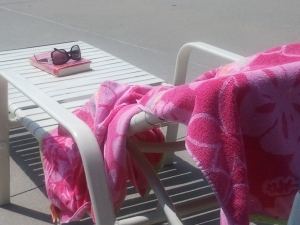I’ve been coloring for years. I’ve always found it relaxing. Usually I buy my coloring books at a dollar store. When I’m coloring within the lines (and sometimes not), I forget about everything.

Coloring can be meditative. (Photo by Cynthia Price)
Now coloring is a hot trend. In 2015, 12 million coloring books for adults were sold, up from 1 million in 2014, according to an AARP The Magazine article in the December 2016/January 2017 issue. I was delighted when a friend gave me a Cityscape coloring book. It’s given me hours of relaxation.
The article confirms what I had already discovered: “Coloring puts you into a flowlike state – which can help you focus and relax – and can lower your blood pressure.”
If you want to try coloring, Aug. 2, is the perfect day as it is National Coloring Book Day, a day to relax and color.
“For me, coloring is meditative – it taps a certain part of my brain and requires a repetitive motion to fill in the colors, and I find it relaxing and allows me to tune out other things and focus on one,” says Aliza Sherman, a speaker, author and web pioneer who has championed women in tech since the 1990s. “There is a nostalgia to coloring – it is something we do as children then give up as we grow up. We all crave the comfort and ease of childhood so there is something almost therapeutic for me when I color.”
At the 2015 NFPW conference Aliza spoke about how coloring can help a person disconnect from being too digital. I followed up with her and asked her to tell me more.
“Coloring is something tangible and tactile – two things that are often missing from our digital and online activities and experiences,” Aliza says. “The mental activity of selecting colors and determining where to place the colors can leads to physical activities like picking up crayons or pencils or pens and inspecting them, testing them out, holding them this way and that. Moving the color across the page is a gradual process that builds over time. There is a satisfying feel of color tool to paper or coloring surface. There is satisfaction as the coloring progresses and is completed.”
Coloring and its slowness is the “antithesis of the rapid-fire pace of digital technology,” Aliza notes. “Coloring taps a different part of your brain than technology, lights it up in different ways and calms parts that are jangled from overusing tech and being way too connected online.”
Why not spend Aug. 2 relaxing with a coloring book?
 I recently returned from a week’s vacation where I did not check in with the office or read work emails (much). I suspect most people won’t believe that, but it’s true. I knew I needed a vacation to recharge. And that’s just what I did.
I recently returned from a week’s vacation where I did not check in with the office or read work emails (much). I suspect most people won’t believe that, but it’s true. I knew I needed a vacation to recharge. And that’s just what I did.